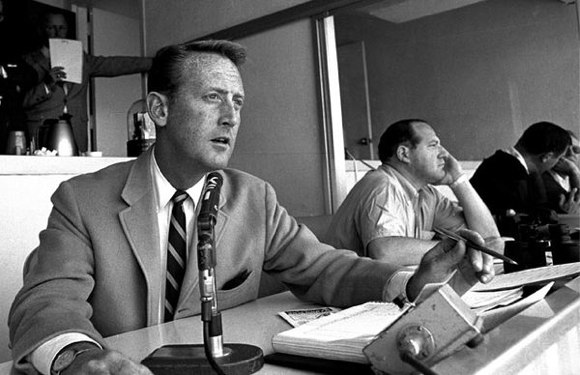
At the risk of sounding redundant, let’s talk broadcasting. Broadcasting is, after all, nothing but talk — and sometimes not even the most substantive talk at that. But the presence of a broadcaster has become a central part of baseball’s essence, writes Jesse Goldberg-Strassler.
Vin Scully is both the voice of baseball and the heart of the greater Los Angeles metropolitan region. Ernie Harwell was the voice of Michigan, Jack Buck was St. Louis, Dave Niehaus was Seattle, and so on.
To the fan, the broadcaster provides a direct pipeline to the field, bringing them closer to the game. It does not matter if the home team is playing on the opposite coast; the daily broadcast puts them right at the field with the knowledge of everything taking place right as it happens. Should a new player arrive in a trade or via Minor League promotion, it is the broadcaster who fills in the blanks, telling the newcomer’s story, offering a first impression of his personality, and describing his past and present exploits. Fans want their players humanized; the odd pre-game interview or fourth inning anecdote accomplishes this perfectly.
A broadcaster who ably breaks down the barrier between fan and player thus strengthens the connection between the fanbase and the ballclub. This works to the benefit of both the individual player and the front office. The player hears increasing support from his family and friends back home, receives a boost to his personal brand, and develops a bond between himself and his adopted city. The front office capitalizes in marketing, sponsorships, and promotion; a beloved star/team brings the front office expanded opportunities. If the team is on the road and yet the city is still engrossed in their results, locked into each night’s broadcast, eagerly anticipating their next homestand, the front office can promote the next series of home games to greater reception.
To this end, the broadcaster takes specific time during each game to promote the upcoming schedule, particularly huge promotional nights, as well as season ticket package specials, social media, and retail items. Sponsorship representatives and incentivized guests visit the booth for an inning, providing a boon to those departments within the team. Besides, not only do the airwaves provide a superb forum to reach the masses, baseball itself is played at a perfect pace to provide such news about the latest specials and events. An at-bat occurs in a certain rhythm, with new information shared between each pitch and the announcement cinched with the proper contact/follow-up details given at the at-bat’s conclusion.
Many broadcasters serve as integral parts of their team’s front office off the air as well, working the phones in corporate and/or group sales, serving as part of the marketing department, handling the team website, and spearheading efforts in social media and PR. If members of the press wish to speak with a manager, coach, player, or member of the front office, it is often the broadcaster who coordinates the interview. (Sometimes it is the broadcaster who has initiated the interview, delving into the team to find the best human interest stories or hottest news, and then contacting members of the media to draw coverage.)
Because of this variety in skills and responsibilities, different ballclubs value different skills and experiences when seeking out a new broadcaster. The majority of Minor League clubs want their broadcaster to bring in the best sales numbers, for instance. Conversely, when the Milwaukee Brewers brought in Joe Block to call games beside Bob Uecker, they were impressed by his social media acumen and ability to connect with their fanbase. On-air ability is a part of a broadcaster’s toolbox, but it is by no means the sole drawing attraction.
As far as broadcasters are concerned, our perspective is rather simple: We broadcast because we love it.
We love the attention, we love watching games each day, we love storytelling, we love interviewing, we love meeting dedicated listeners (whether fans or family members of the players), we love the daily routine of it all, we love the unpredictability of each pitch, we love the relaxed nature of the first inning as the game eases in, we love the emotion of the ninth inning as everything builds to a thrilling finish, we love when the crowd goes wild, we love having a great partner at our side to banter with, and, more importantly than anything else, we love the game of baseball.
We broadcast in very different ways from one another. Some of us are relaxed, others high-strung. Some of us let the game breathe, others do nothing but talk. Some of us calmly call the latest home run, others extoll it to the heavens. This is what makes the game great: There’s a place in baseball for both Vin Scully’s melodic cadence and Ernie Harwell’s scientific give-the-score directness; for Hawk Harrelson’s joyous homerism and Dan Shulman’s professional enthusiasm. It may not all be to your liking, but this is a diverse country with diverse listening tastes. Each Major League or Minor League town with a broadcaster has its own voice, and that voice — whether Jerry Howarth or Pat Hughes, Russ Langer or Jeff Hem — represents summer for all who cannot see the game.
